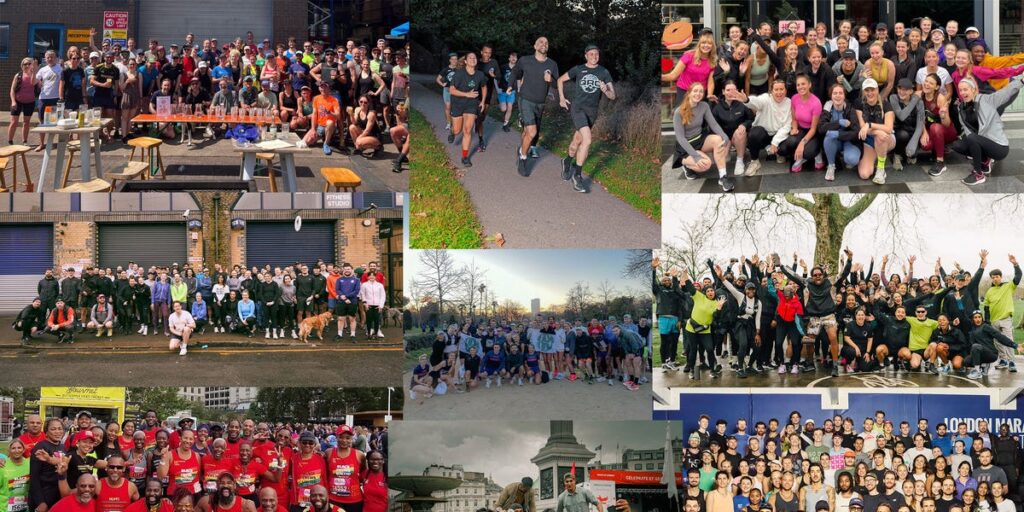Running’s Inclusive Evolution: A New Era for Enthusiasts
The running community is experiencing a significant transformation, marked by an influx of individuals who once felt alienated from the sport. This newfound participation highlights the progress made toward making running more accessible, especially for marginalized groups. The traditional image of a ‘runner’—one defined by speed, fitness level, or a certain body type—is being redefined. More people are discovering that running can be a source of social connection and mental well-being, transcending the mere act of logging miles. Running groups now increasingly combine fitness with social activities, blending exercise with gatherings over coffee, cake, and craft beer, creating a more inviting atmosphere.
Driving this surge are innovative running groups that have taken a fresh approach to the sport. Inspired by London’s Run Dem Crew, many of these groups prefer the term ‘crew’ over ‘club,’ suggesting a more casual and youthful vibe. These emerging communities prioritize social interaction over strict training regimes, advocating that the joy of running should be inclusive and fun rather than competitive. The shift resonates particularly with younger generations who value community engagement, revealing that social connection is now a leading motivator for exercising together. According to Strava’s Year in Sport Trend Report, Gen Z is 29% more inclined than Millennials to seek out group exercise experiences.
The Rise of Diverse Running Groups
Among the notable new organizations is the Queer Running Club, founded in 2019, which functions as a safe space for LGBTQ+ individuals. Founder Kole Fulmine notes that the community aspect of running allows for political expression linked to personal identity. Initially beginning with one run per week, the club has expanded tremendously, now hosting multiple training sessions each week and participating in races designed to be welcoming for the queer community. By validating the experiences of marginalized individuals, this organization is eliminating barriers to participating in the sport.
Empowering Underrepresented Youth Through Running
Another significant player is The Outrunners, which combines running with social outreach initiatives aimed at youth in Hackney. Founded by Tyler Williams Green, this group focuses on empowering young individuals, particularly those from underrepresented backgrounds, through various programs that highlight movement and fitness as accessible to everyone. Their inclusive approach aspires to change the narrative surrounding running, enabling more youth, especially girls from diverse backgrounds, to embrace the sport without the pressure of competition.
A Women’s-First Approach to Running Communities
Emerging groups such as These Girls Run, established in 2021, prioritize creating safe running environments for women. Founder Molly Slater-Davison crafted this community in response to personal experiences of fear during solo runs. With weekly runs across cities and a supportive atmosphere, the group fosters connections among women, enabling them to enjoy running while addressing safety concerns. Their initiative to make running a shared experience allows participants to celebrate each other’s achievements in a non-competitive environment.
Facilitating Mental Wellness Through Running
Additionally, organizations like CALM Clubs are gaining traction by focusing on mental health support through running. Founded as a response to rising mental health concerns, this initiative provides practical resources and creates opportunities for social connection among members. By collaborating with existing clubs, CALM Clubs aim to strengthen community bonds while promoting mental wellness, showing that running is not just about physical fitness but also enhancing life quality through emotional support.
The Broader Impact of Inclusion in Running
This movement toward inclusivity in running is reshaping the sport’s landscape, making it more accessible to diverse communities. From queer and women-focused groups to initiatives aimed at youth engagement and mental health support, this new wave of running crews is redefining the narrative. They emphasize personal connections, shared experiences, and inclusivity rather than individual accomplishments or aesthetic standards. As these organizations continue to grow, the impact on communities can foster a broader cultural acceptance of running as a universal pastime that welcomes everyone, irrespective of background or ability.
